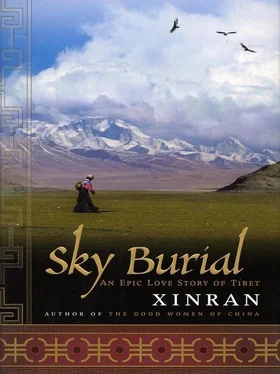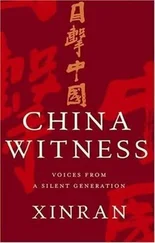Eventually, the family felt that Wen had recovered sufficiently for them to move on. On the day of departure, Wen woke at dawn to see the shadows of Gela and Saierbao swaying in the weak light. She noticed that many of the things from the tent had been parceled up into rolls to be carried by the yaks. Because she hadn’t yet learned to ride, Gela’s brother, Ge’er, had made a kind of saddle shaped like a round-backed chair for her out of a few luggage rolls, so that she would not fall off her horse if she went to sleep. He indicated to her that he would take charge of her reins.
The path their journey followed was very hard going. Storms forced them to stop and they had to huddle among the yak herd. At night they slept in the open air, sheltered from the snow and wind by mountain rocks. They did not see another soul. Wen couldn’t imagine who the “bandits” were that the Liberation Army had been hunting in this deserted area.
As the altitude, the hard riding, and the unfamiliar food began to gnaw away at her strength and spirit, she was plunged into depression. Was Kejun suffering as she did? And how would she ever find him in these snowy ice fields where she had neither language, survival skills, nor any means of transport? She had lost all sense of time. Each day was like the other and she did not know if they had been traveling for days or weeks. When finally they arrived at their destination, Zhuoma told her that they were close to the Bayan Har mountains and would set up their spring camp in the lush grassland near the Yalong River. For half a day, Gela and his sons hammered in poles, hung the tent, and secured the guy ropes. Once the tent was up, Saierbao and her daughters deftly arranged their household items. Wen sat by the luggage, clumsily helping them out with a few light tasks. Just as she was about to hand a prayer wheel to Saierbao, Zhuoma stopped her, warning her that outsiders shouldn’t touch objects of worship.
According to their custom, after setting up house the family feasted on meat, tsampa, fritters, and barley wine. Just as she did while they were on the road, Saierbao prepared Wen some medicinal milk tea. After the feast, Gela led a prayer ceremony. That night, when they were all lying together on the ground, Wen wedged between Zhuoma and the daughter Ni, Zhuoma whispered to her that, as well as praying for the yaks and sheep to get fat and strong, Gela had prayed for the spirits to protect Wen. Wen was deeply moved and, when she thought no one was listening, quietly recited to herself the Buddhist mantra: Om mani padme hum.
The next day, helped by Saierbao, Wen put on a Tibetan gown for the first time. They were the “maiden’s clothes” that Saierbao had worn before her marriage and consisted of a set of white undergarments made of a coarse cloth, a long-sleeved collarless shirt fastened at the side, and a pair of trousers, richly decorated and gathered in at the ankles. Over this, Wen put on a thickly lined robe of blue, pink, and purple cloth that hung all the way down to her feet. Saierbao showed her how to wrap it across the front of her body and secure it with a broad brocade belt. She then tied a rainbow-striped length of cloth rather like an apron to the front. Wen was still frail, so to help her withstand the cold mountain winds, Saierbao gave her a high-necked sheepskin waistcoat and some felt boots. The boots were far too big, but Zhuoma said that it didn’t matter: in cold weather they could stuff a thick layer of yak’s wool inside for warmth.
Finally, Saierbao tied a jade amulet to Wen’s waist and placed a rosary of wooden prayer beads around her neck “They will protect you,” explained Zhuoma. “They will keep evil at bay and drive away ghosts.” Then she smiled and silently placed a string of her own carnelian beads around Wen’s neck.
Saierbao made a sign to Wen to sit down, and standing in front of her, she parted her hair with a comb and made two braids on either side. The youngest daughter, Pad, who was standing to one side, then gestured to Wen to look at herself in a bowl of water she had standing ready. Wen could hardly believe her eyes: apart from the fact that her braids were too short because she had only shoulder-length hair, she looked like a proper Tibetan woman. She tucked her precious book containing Kejun’s photograph and her sister’s paper crane inside the big pocket of her Tibetan robe.
A few days later, Wen noticed that someone had laid a cloth bundle on her sleeping space. It was her uniform, now cleaned and mended. Wen was so touched that she didn’t know what to say. She held the clothes in both hands, inhaling the tang that came from the sun of the high plateau, and bowed deeply to Saierbao.
ZHUOMA TOLD Wen that Tibetans said there were only two seasons, summer and winter, because, in Tibet, spring and autumn were so brief. But that spring was a very long one in Wen’s life: she spent many sleepless nights, longing for Kejun and turning over and over in her mind her uncertain future. She couldn’t imagine how she could possibly continue to survive in such harsh conditions, or learn a language that seemed to her utterly impenetrable. Although she knew there must be other nomadic families in the region because Zhuoma had told her that Gela and Ge’er met other herders when they were out at the pastures, the women saw nobody. She began to doubt whether Zhuoma had been right in thinking there would be an opportunity to get information about Kejun and Tiananmen. Both she and Zhuoma were so absorbed in their struggle to adapt to the nomadic way of life that each had entered her own private world, and they rarely discussed what they would do next. Despite her loneliness, though, Wen had begun to feel great affection for the family, particularly its matriarch, Saierbao.
Saierbao’s face was so weathered that it was hard to tell how old she was, but Wen guessed she must be about thirty. She was an extremely calm and dignified woman who seemed to savor all her chores, however tough and exhausting they were. She never shouted or scolded. Even if someone knocked over her freshly made tsampa or spilled her milk tea, she didn’t get cross. At most she would purse her lips and smile briefly as if she had seen it coming. Saierbao loved jewelry and draped herself in precious things even on ordinary days: with her necklaces, bracelets, and waist ornaments of agate, jade, gold, and silver, she was like a multicolored wind chime. Wen rarely saw Saierbao rest: her tinkling began the moment the first rays of light sneaked into the tent; at night, the whole family took its cue for sleep when her chimes fell silent. Wen would imagine performing the routines of life with Kejun in the manner of Saierbao: bearing and raising children, husband and wife working together in harmony. But every night, as soon as the final movement of Saierbao’s daily concert drew to a close, Wen was brought back with a jolt to her longing and isolation, and her face would be bathed in tears.
Gela seemed older than Saierbao. He was a man of few words, but was the spokesman for the family. One of the popular Chinese myths about Tibetans was that the men were tall and strapping, but Gela was not much taller than his wife. Neither fat nor thin, his face neither humble nor arrogant, happy nor angry, he gave an impression of reliability, but he was not an easy man to read. Even the animals, Wen discovered, recognized Gela ’s dignity and authority: no sheep would wander off, no horse would refuse to allow its hoof to be picked up when Gela was around. Everyone, human and animal, took their orders from Gela’s body language: he was a model patriarch.
Ge’er was close in age to his older brother, Gela. The two were very alike, except that Ge’er was thinner. Wen found herself wondering whether he was a mute. He never spoke, not even when he was playing with Hum, the youngest child, of whom he was very fond. Zhuoma told Wen she’d heard Saierbao say Ge’er was the best craftsman in the family, and Wen often saw him mending tools with extraordinary concentration.
Читать дальше












